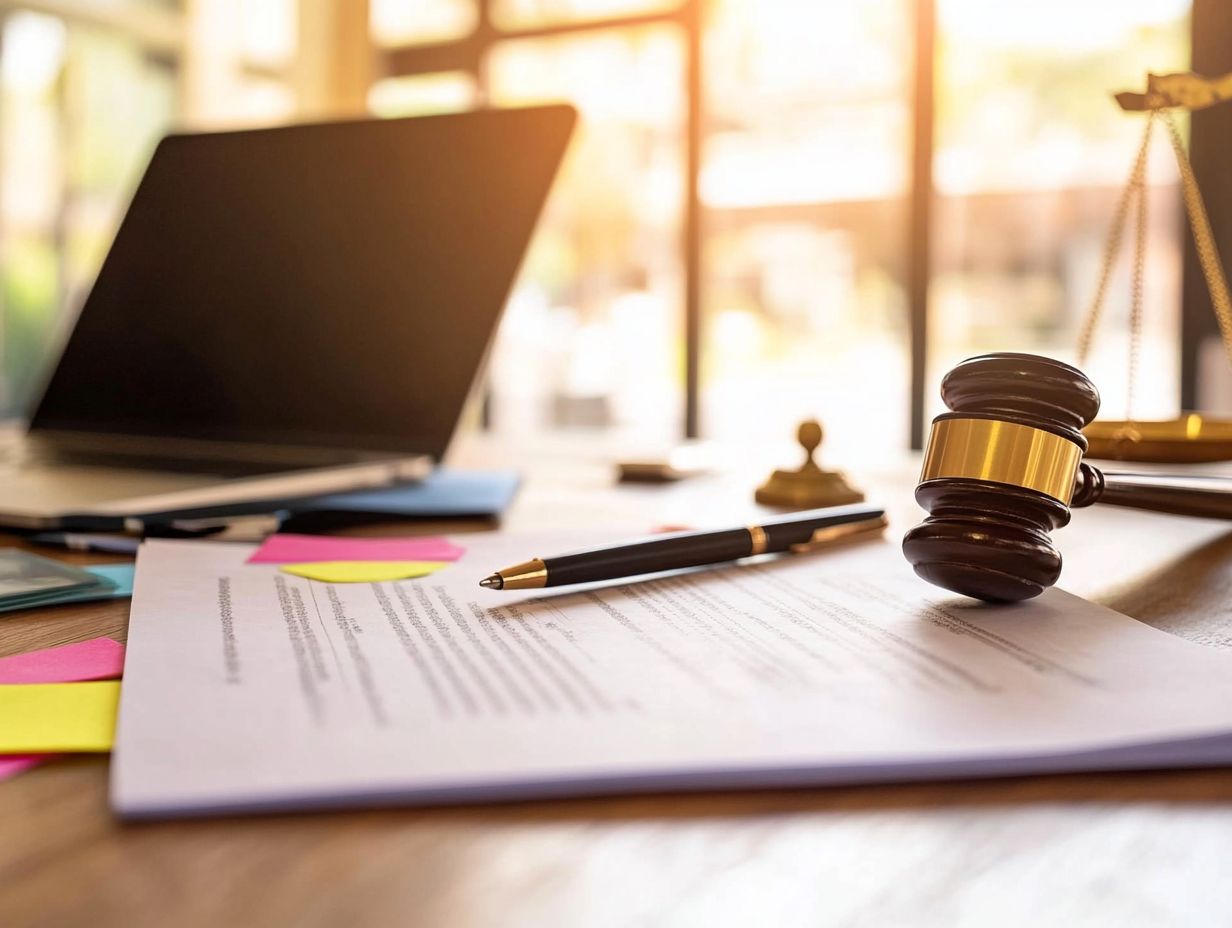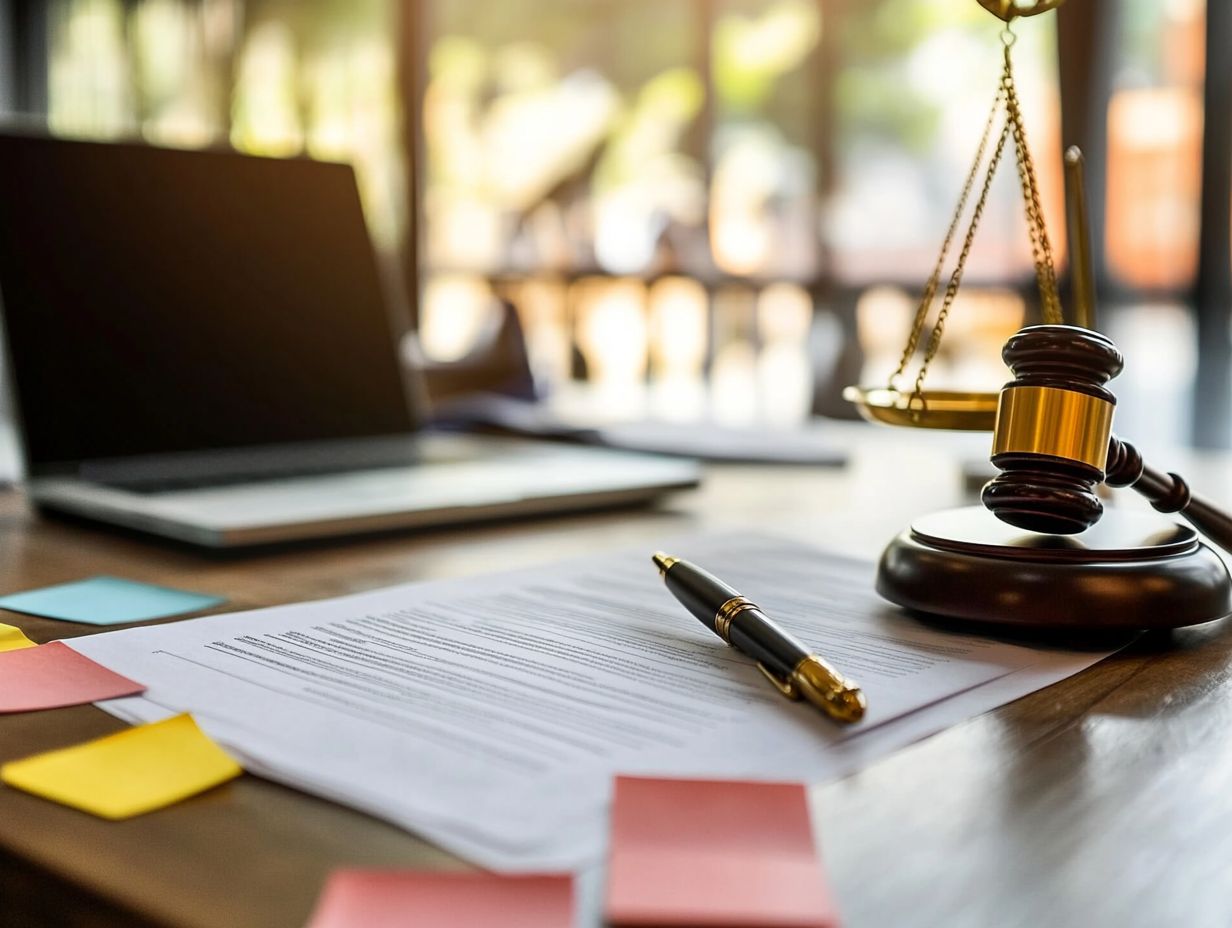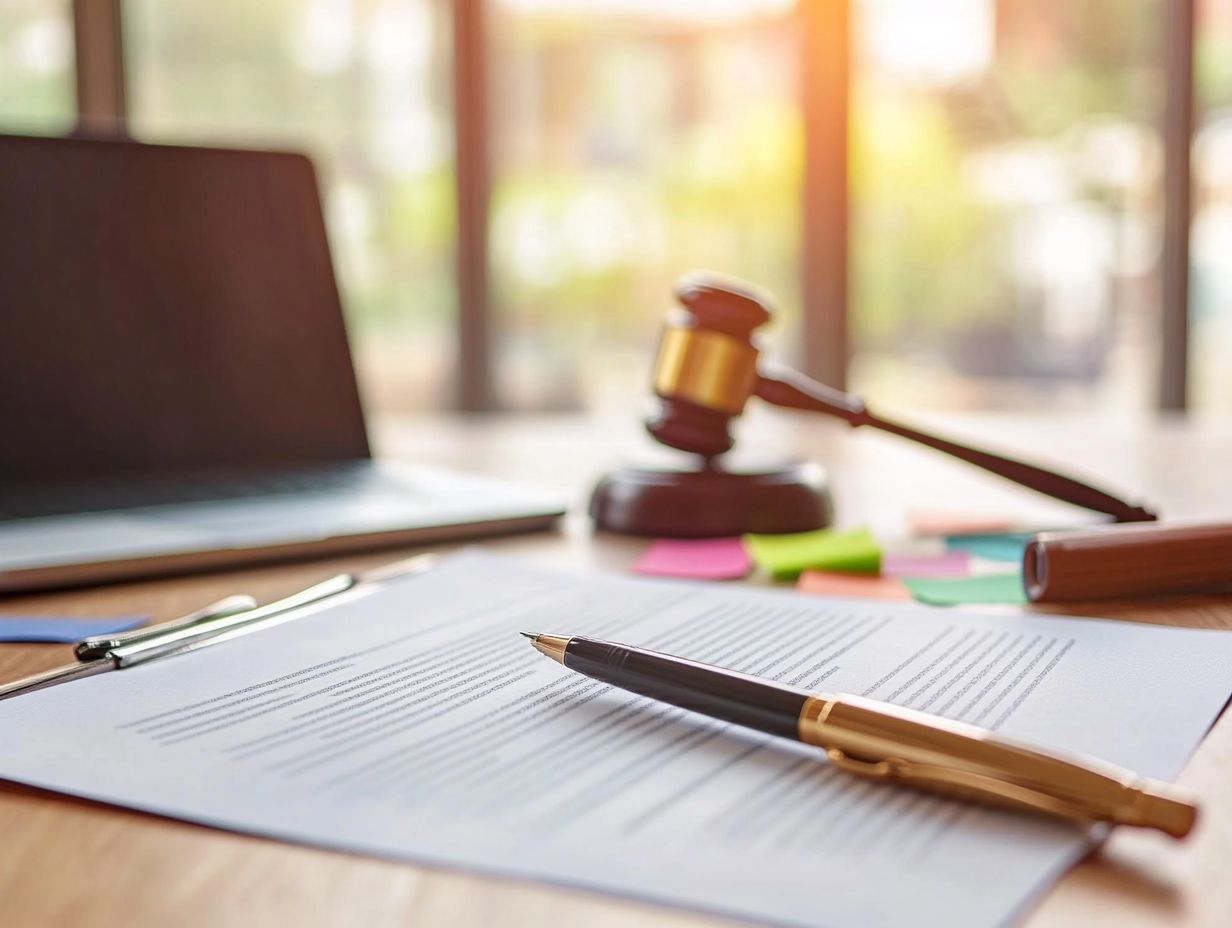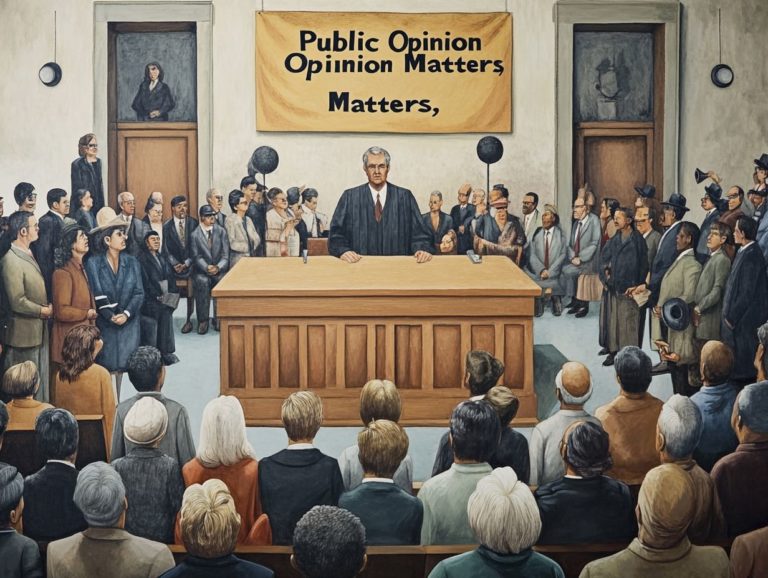The Importance of Documentation in IP Litigation
In the world of intellectual property (IP) litigation, quality documentation is key. It can determine the outcome of your case.
This exploration highlights the importance of documentation in IP disputes. We ll illustrate how it can either strengthen or weaken your legal argument.
You’ll learn best practices for documenting your IP and common pitfalls to avoid.
By understanding how documentation impacts litigation outcomes, you’ll be better equipped to protect your valuable intellectual assets.
Contents
- Key Takeaways:
- Overview of Intellectual Property and Litigation
- The Role of Documentation in IP Litigation
- How to Properly Document Intellectual Property
- Using Documentation in IP Litigation
- Frequently Asked Questions
- What is the importance of documentation in IP litigation?
- What types of documentation are important in IP litigation?
- How does proper documentation help in IP litigation?
- What can happen if I do not have sufficient documentation in IP litigation?
- How can I ensure proper documentation for my intellectual property?
- Are there any legal requirements for documentation in IP litigation?
Key Takeaways:

Proper documentation is crucial in IP litigation. It helps establish ownership, defend against infringement claims, and prove damages. Understanding the importance of licensing in IP litigation is also vital. Types of documentation include contracts, patents, trademarks, trade secrets, and copyright registrations. Best practices involve keeping detailed records, conducting regular audits, and seeking legal advice for compliance.
Overview of Intellectual Property and Litigation
Intellectual property (IP) covers legal rights that protect creations of the mind, like inventions and artistic works. These rights are essential in disputes, requiring solid legal strategies.
Understanding IP litigation helps you protect your rights and build strong business relationships.
The Role of Documentation in IP Litigation
Documentation is a crucial element in IP litigation, as it profoundly impacts cases involving patents, copyrights, and trademarks and the importance of IP due diligence.
By maintaining accurate documentation, you create essential evidence for ownership claims and defenses in court.
Proper documentation establishes proof of ownership and strengthens your overall litigation strategy. This preparation helps you navigate the legal landscape confidently.
Why Documentation is Important
Documentation protects your intellectual property and provides clear proof of ownership. Keeping detailed records promotes transparency and secures sensitive information through private contracts.
In IP contexts, documentation goes beyond verifying ownership. It includes materials like registration certificates and licensing agreements that clarify your rights and prevent disputes.
Thorough documentation builds trust among partners. Clear terms enhance collaboration and drive innovation forward.
With effective documentation practices, you can boost your legal standing and compete in the market confidently!
Types of Documentation Used in IP Litigation

In IP litigation, several types of documents play vital roles. These include invention disclosures, patent applications, design documents, and evidence of infringement.
Each element contributes to substantiating your claims in a legal context. These documents form the backbone of the litigation process, providing clear documentation practices that can bolster your case.
Whether you are defending against claims or pursuing infringement actions, invention disclosures offer essential insights into your creative process. Patent applications secure legal protection for your innovations.
Design documents detail the aesthetics and functionality of your creations. They are crucial for addressing claims of design infringement. Evidence of infringement, such as product samples and sales data, is essential for demonstrating unauthorized use.
To ensure these documents are effective, best practices involve maintaining meticulous records and using consistent formatting. Regularly updating files to reflect ongoing developments also enhances their value.
This proactive approach assists your attorneys in building a robust case and enhances the overall credibility of your entity.
How to Properly Document Intellectual Property
Properly documenting your intellectual property (IP), which refers to creations of the mind like inventions and designs, is crucial for safeguarding your ownership rights. This ensures you can fully leverage your innovations for economic gain.
By adopting best practices in documentation such as securely storing design documents and adhering to non-disclosure agreements (NDAs) you can significantly bolster your protection against potential legal challenges.
This diligent approach not only fortifies your defenses but also establishes clear records of your intellectual property, setting you up for success.
Best Practices for Documenting IP
Implementing best practices for documenting intellectual property is essential for effectively protecting and managing your innovative assets. This involves maintaining detailed records and ensuring secure storage for sensitive information.
Utilizing non-disclosure agreements (NDAs) helps shield confidential communications that could jeopardize your ownership rights in legal situations. Thorough documentation serves as clear evidence of asset creation and ownership.
It simplifies enforcing your rights during disputes. Securing sensitive data using encrypted storage solutions or password-protected files significantly reduces the risk of unauthorized access.
When you employ NDAs with employees, partners, and contractors, you ensure shared ideas remain confidential. This minimizes the chances of leaks or theft of valuable information.
By integrating these strategies, you can protect your intellectual property. Foster a culture of respect for innovation and creativity within your team.
Common Mistakes to Avoid in Documenting IP
Avoiding common mistakes in documenting your intellectual property is essential for mitigating risks of legal disputes. This ensures your evidence remains strong against claims or breaches of contract.
Insufficient documentation can lead to significant setbacks in litigation and jeopardize your ownership rights. Recognizing these pitfalls early is your best defense!
For example, many creators overlook maintaining detailed records of their development processes. This can lead to disputes over the origin of an idea.
Failing to register your IP with relevant authorities can leave you vulnerable to infringement claims and complicate your legal landscape. Neglecting proper licensing agreements can lead to unauthorized use and escalate conflicts.
By establishing comprehensive documentation practices like meticulously tracking creation dates, applying for patents, and retaining emails related to collaborations you can prevent these scenarios from arising.
By being diligent and organized, you can strengthen your legal standing and protect your valuable intellectual assets. Start protecting your ideas today!
Consequences of Poor Documentation

Poor documentation can lead to high litigation costs and challenges in proving infringement in court. Understanding key factors in IP litigation is crucial, as without solid evidence, your ability to recover damages diminishes.
You risk missing the statute of limitations, which can limit your ability to enforce your rights. This situation not only strains your finances but also weakens your competitive position.
Without precise records, you could find yourself at a disadvantage in legal disputes. Courts may question the validity of your claims due to unreliable documentation.
Vague documentation can extend litigation timelines and increase your expenses. The consequences of inadequate documentation can threaten your long-term business viability.
Using Documentation in IP Litigation
Good documentation is your best ally in IP litigation. It provides essential evidence that supports your legal claims and defenses, highlighting the importance of a strong IP policy in litigation.
Organized and thorough materials can influence judicial decisions. They are vital in shaping the narrative of your legal journey.
How Documentation Can Impact a Case
Documentation is powerful in shaping your case. It provides concrete evidence that can sway the litigation process.
Well-organized records strengthen your claims and enhance your credibility in legal proceedings. When presenting clear, maintained records in court, you illustrate your perspective effectively.
Documented timelines and detailed event descriptions reduce ambiguity. This not only strengthens your position but also lays a foundation for future negotiations.
Frequently Asked Questions
What is the importance of documentation in IP litigation?

Good documentation is your best ally in IP litigation. It serves as evidence to support your case and highlights the importance of documentation in trade secrets to protect your intellectual property rights.
It establishes a clear record of ownership, use, and development of your IP, making it easier to prove your rights in court.
What types of documentation are important in IP litigation?
Any documentation that proves the existence and ownership of your intellectual property is crucial in IP litigation. This includes patent, trademark, and copyright registrations, as well as understanding the importance of public relations in IP litigation.
Contracts, agreements, and correspondence related to your IP are also essential.
How does proper documentation help in IP litigation?
Proper documentation strengthens your case by providing a clear timeline of events. It backs up your claims of ownership and counters false claims from the other side.
What can happen if I do not have sufficient documentation in IP litigation?
If you lack sufficient documentation, it can weaken your case. This makes it challenging to defend your intellectual property rights.
Without proper documentation, the opposing party may challenge your ownership and potentially win the case.
How can I ensure proper documentation for my intellectual property?
To ensure proper documentation, keep accurate and organized records of all relevant documents. This includes contracts, agreements, and registration certificates.
Document everything related to the creation, use, and ownership of your intellectual property.
Are there any legal requirements for documentation in IP litigation?
While there are no specific legal requirements for documentation in IP litigation, it’s a good idea to keep thorough and accurate records to protect your intellectual property. Understanding the role of technology in modern IP litigation can further enhance your protection strategy.
Talking to a lawyer who knows about IP litigation is crucial. They can help ensure your documentation meets legal standards and effectively supports your case. Protect your ideas now by keeping good records!






